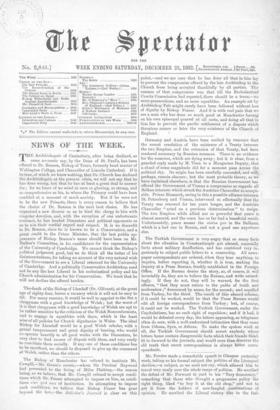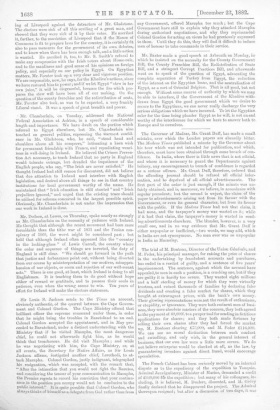Mr. Forster made a remarkable speech in Glasgow yesterday week,
taking as his formal subject the politics of the Liverpool election,—a subject, as we need not say, which allowed him to travel very easily over the whole range of polities. He ascribed the defeat of Mr. Forwood in part to his "Tory democracy," remarking that those who thought a progressive policy the right thing, liked "to buy it at the old shop," and not to get it from the holders of new-fangled combinations of opinion. He ascribed the Liberal victory also to the feel-
ing of Liverpool against the detractors of Mr. Gladstone. The electors were sick of all this reviling of a great man, and showed that they were sick of it by their votes. He ascribed it, further, to the conviction of Liverpool that if the House of Commons is fit to prepare laws for the country, it is certainly fit also to pass measures for the government of its own debates, and to know when there has been enough talk, and a little action is wanted. He ascribed it, too, to Mr. S. Smith's refusal to make any compromise with the Irish voters about Home-rule, and to the manliness and good sense of his opinions on foreign policy, and especially on our policy in Egypt. On Egyptian matters, Mr. Forster took up a very clear and vigorous position. We are responsible, now, he says, for the Khedive's actions, since we have restored him to power; and if we let Egypt "stew in her own juice," it will be disgraceful, because the fire which pre- pares the stew will have been all of our making. On the question of the county franchise and the redistribution of seats, Mr. Forster also took, as was to be expected, a very frankly Liberal stand. It was a speech of great breadth and power.


































